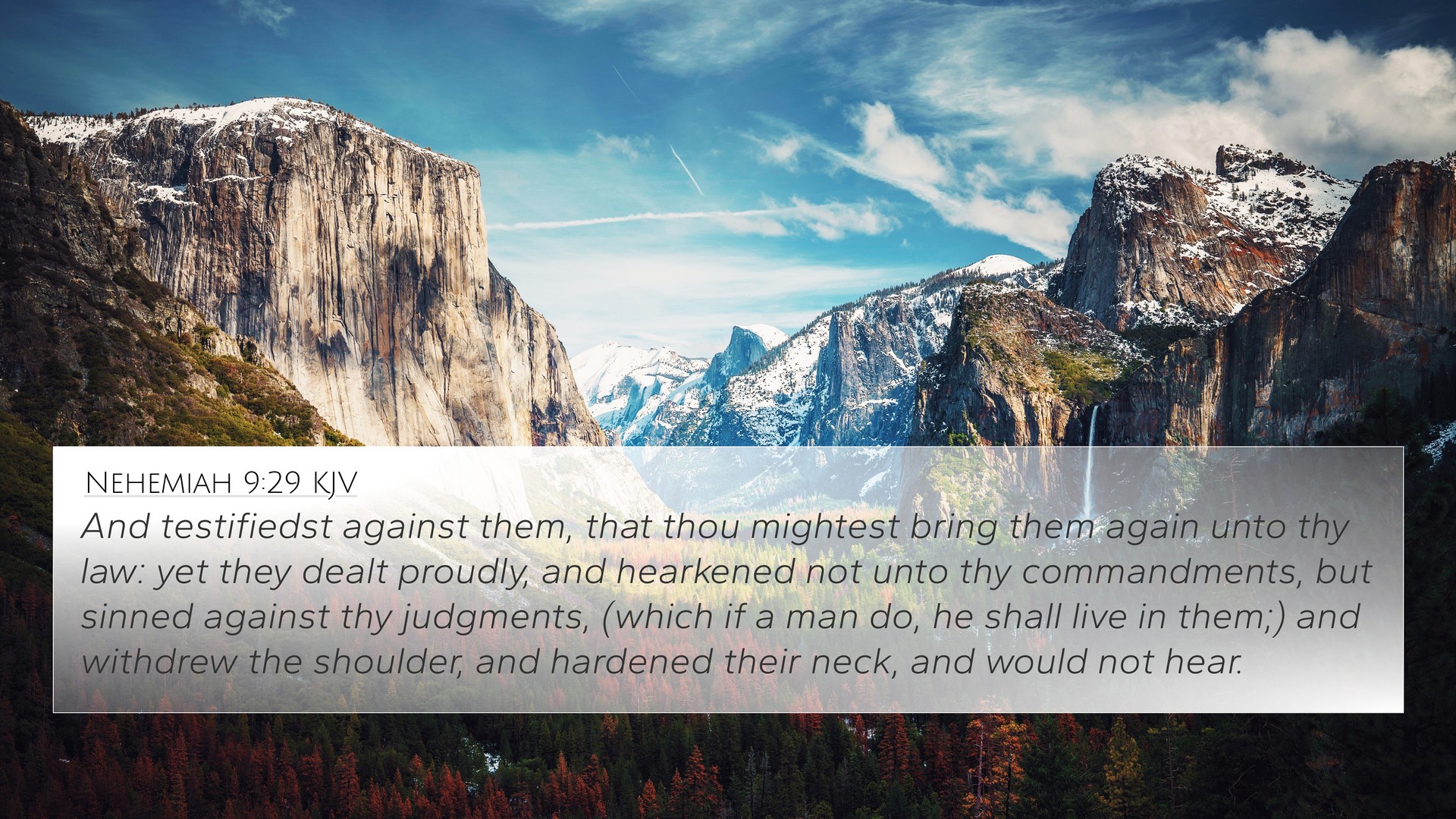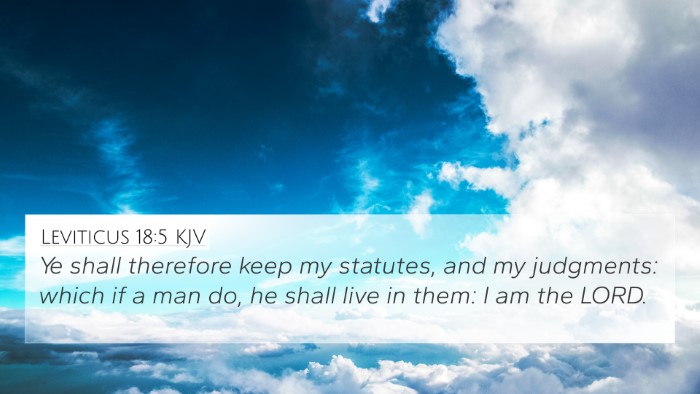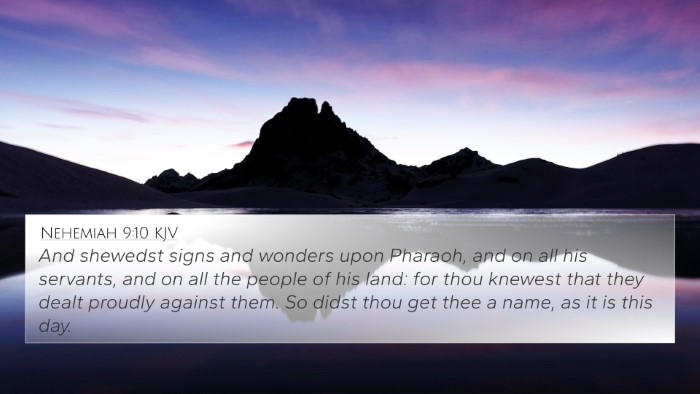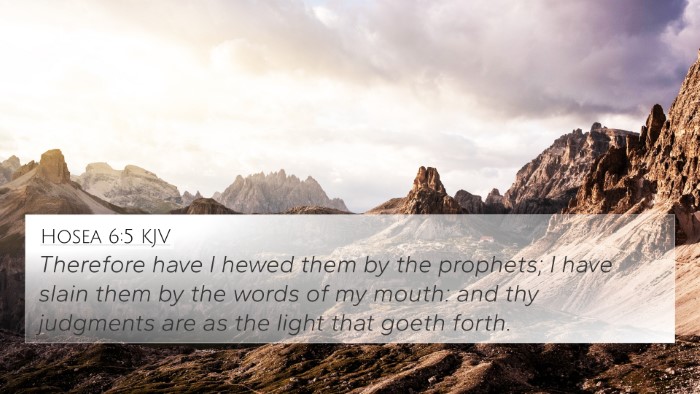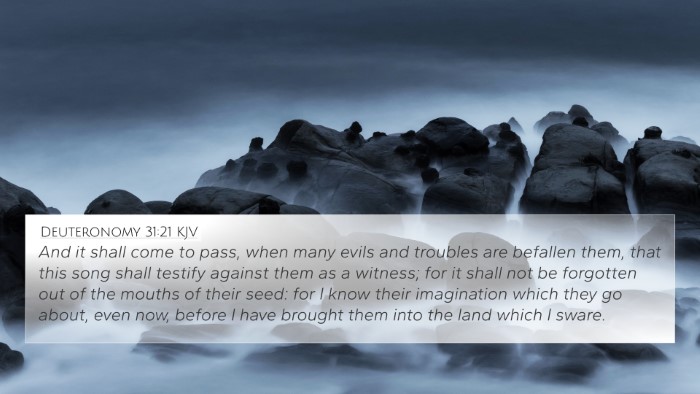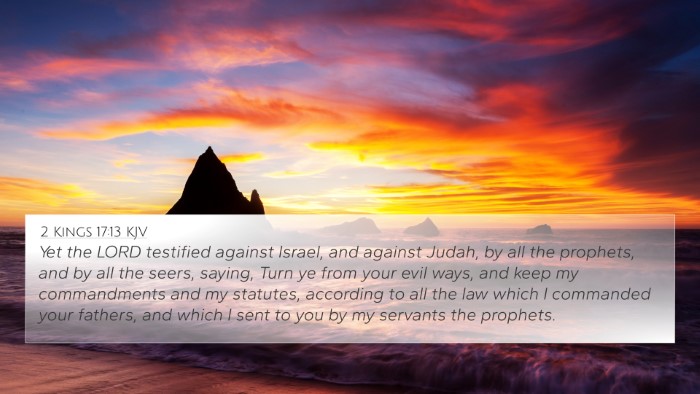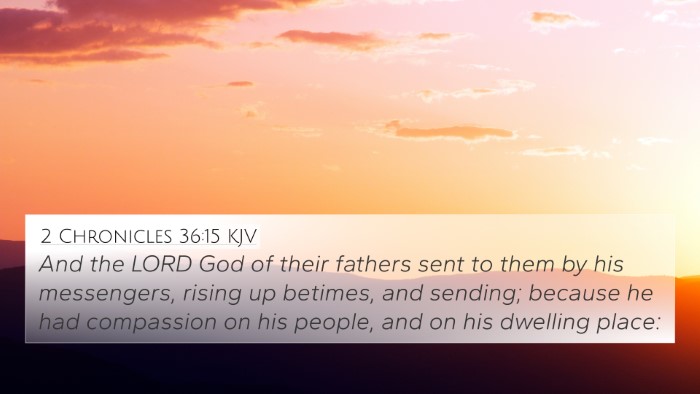Understanding Nehemiah 9:29
Verse Context: Nehemiah 9:29 states, "And made a covenant with them to do what you command, but they acted presumptuously and did not obey your commandments." This verse encapsulates the recurring themes of covenantal relationship, disobedience, and the justice of God in the history of Israel as recorded in the Old Testament.
Summary of Commentary Insights
In examining Nehemiah 9:29, we draw insights from various public domain commentaries, revealing the depth and meaning of this passage.
1. Covenant and Responsibility
Matthew Henry emphasizes that God’s covenant is not merely a ceremonial act but carries heavy implications for moral and spiritual responsibility. The Israelites accepted the covenant with enthusiasm but failed to uphold their part, which speaks to human propensity to commit to God yet falter in obedience.
2. The Nature of Disobedience
Albert Barnes provides insight into the nature of disobedience depicted in the verse. He notes that acting "presumptuously" signifies a willful rebellion against the known commands of God. Barnes contends that despite God's prior interventions and grace, the Israelites continued to persist in their rebellious actions, demonstrating the hardness of heart that can arise in human nature.
3. Historical Reflection
Adam Clarke contextualizes this disobedience within the broader history of Israel. He reflects on the cyclical pattern of sin, judgment, repentance, and restoration seen throughout the Old Testament. Clarke points out that this verse serves as a poignant reminder of the consequences of forsaking God's commandments and highlights the importance of sincerity in faithfulness.
Cross-References to Enhance Understanding
- Exodus 19:5-6: God's covenant with Israel, emphasizing their chosen status.
- Deuteronomy 30:15-20: Life and death set before Israel — a call to choose obedience.
- Joshua 24:24: The people's commitment to serve the Lord, reflecting their initial excitement.
- Jeremiah 31:31-34: The promise of a new covenant, emphasizing the failure of the old.
- Romans 2:13: Paul’s assertion that the doers of the law will be justified, illustrating the importance of obedience.
- Hebrews 4:6: A warning against disobedience in the light of God's promise.
- 1 Peter 1:14: A call to be obedient children, contrasting the disobedience of Israel.
Connections and Implications
The thematic connections among these verses illustrate a consistent biblical narrative about covenant fidelity and the nature of God's expectations for His people. Nehemiah 9:29 is not an isolated incident but resonates with numerous biblical themes, reflecting on:
- The importance of obedience: The overarching message in both the Old and New Testaments about following God's commandments.
- God’s faithfulness versus human unfaithfulness: A contrast seen throughout scripture, highlighting God's unchanging nature despite human failures.
- The call to repentance: God's instruction throughout both covenants emphasizes turning back to Him after disobedience.
Comparative Bible Verse Analysis
When analyzing Nehemiah 9:29 in conjunction with other scriptures, one can glean valuable insights on:
- Disobedience's impact on community: The collective nature of Israel's sin serves as a lesson on how individual actions can lead to communal consequences.
- Grace amid failure: Even in their failings, God's grace provides pathways for restoration, displayed throughout both Testaments.
- God's enduring hope for His people: Despite repeated failures, God's desire is for reconciliation and fidelity, a theme that echoes from Genesis to Revelation.
Tools for Bible Cross-Referencing
Understanding the connections between Bible verses can be enhanced through various tools. Here are some methods for effective cross-referencing:
- Utilizing a Bible concordance to find related themes and words across multiple scriptures.
- Engaging with a Bible cross-reference guide to discover thematic links not immediately evident.
- Participating in cross-reference Bible study groups for communal insights and diverse perspectives.
- Exploring Bible reference resources that compile lists of moments where verses connect or mirror each other.
Reflections on Themes
To reflect on the meanings and implications of Nehemiah 9:29, one can consider:
- How to identify connections: What methods can you explore to find cross-references in the Bible that enhance your understanding of passages like Nehemiah 9:29?
- Bible verses related to themes such as obedience and covenant: Which other scriptures reinforce or challenge the messages found in this verse?
Conclusion
Nehemiah 9:29 serves as a profound reminder of the expectations laid upon God's people within the framework of His covenant. The insights drawn from this verse—not only through its direct interpretation but also through comparative analysis with other scriptures—yield a rich understanding of scriptural themes. Through diligent study and resources, believers can deepen their grasp of biblical messages that continue to resonate through generations.
